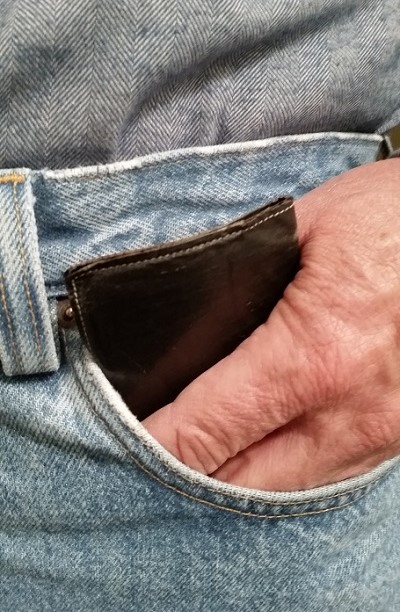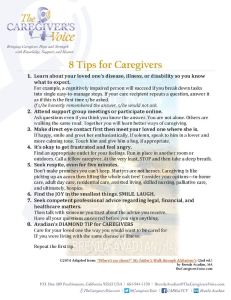 Despite my father’s diagnosis of dementia at age 86 and Alzheimer’s shortly thereafter, he was physically healthy. While he lived with us, I’d take him shopping. The outing gave him a change of pace and he kept me company.
Despite my father’s diagnosis of dementia at age 86 and Alzheimer’s shortly thereafter, he was physically healthy. While he lived with us, I’d take him shopping. The outing gave him a change of pace and he kept me company.
One day in late November, after the holiday shoppers had made a mess of the store shelves, my father spotted a wallet in the kitchen aisle at Walmart.
 A man with integrity, he snatched up the wallet and put it in his front left pocket. Aghast at how smoothly and effortlessly he performed this maneuver, I doubted my eyes. Maybe it’s his wallet, I thought. Deep down, I knew better.
A man with integrity, he snatched up the wallet and put it in his front left pocket. Aghast at how smoothly and effortlessly he performed this maneuver, I doubted my eyes. Maybe it’s his wallet, I thought. Deep down, I knew better.
Instead of accusing or questioning him, I asked him if he could loan me some money. I always put some singles and fives in his wallet and sometimes even a twenty to make him feel comfortable as a provider. He reached in his back right pocket and pulled out his wallet, looked inside, and then handed it to me. “Here little girl, it’s all yours. Leave a dollar in case of an emergency.”
Hmmm, how am I going to get him to show me what’s in his left front pocket?
Growing flushed and feeling uncomfortable, I wondered what to do. If he leaves with it, he’ll be accused of shoplifting. With his cognitive impairment, he’d be confused and traumatized if he were detained and questioned. Do I ask for help from a clerk or security?
Seriously now, we’re talking Walmart! If my experience dealing and communicating with people with dementia can’t help me, how can I expect a store clerk or security to understand?
“Hey Mardig” (his name, Martin pronounced in Armenian as MAR-deeg), “whacha got there?” I asked playfully acting as his accomplice.
“Shhhh,” he replied sternly, looking around.
“Awwww, c’mon I wanna see,” I begged. “No one’s looking. Look no one’s here!”
Yeah, right! Cameras overhead and who knows what else. Maybe even an RFID tracking device.
He pulls out the contraband.
“Oh cool!” I say, trying to remain his accomplice.
“Shhhh,” he warns me as he puts it in his pocket. “It’s mine.”
“Does it have any money in it?”
Curious, he removes it slowly and checks as I stand close, eagerly looking.
It’s a brand-new wallet but has no identifying label, price tag or anything else on it. Maybe, someone tried to pilfer it and thought better of it.
It was then, I told him, it belongs to the store and we’d need to pay for it.
“No it’s not. Look, where does it say it’s the store’s?”
He had a point. There was no identifying marker on it at all.
I don’t recall how he managed to give it up… PHEW! I can laugh about it now, but that was close!
Has something similar happened to you? How did you handle it?
Share your experience and then click on the link or image to help others with Tips for Caregivers.
Are you receiving The Caregiver’s Voice Newsletter? Receive caregiver tips and inspiration every month with a bit o’ FUN when you SIGN UP for The Caregiver’s Voice Newsletter.










Pay for it and forget about it. My mom did it too. Nail polish and chocolate bars. Like everything else, it passes.
Yes, I agree.
Also, wish it were as easy as you mention, Susan.
As I wrote in the story, he refused to remove it from his pocket and when he did there was no label on it… He wanted it and didn’t want anyone to know it.
You can’t got through a checkout and say, “Hey, my father has a wallet in his pocket.”
They’ll need to know how much to charge. LOL!